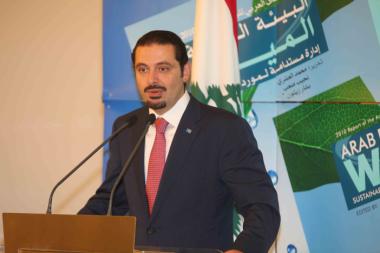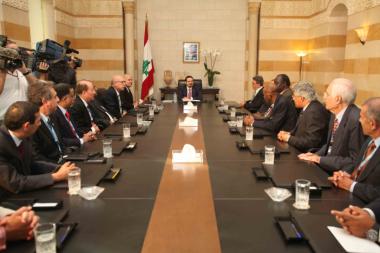AFED Announces its Recommendations in Grand Serail
Water Management is Cheaper than Increasing Production
Hariri: I Promise to Support Implementing Your Recommendations
Beirut, 5 November 2010

The Arab Forum for Environment and Development (AFED) concluded its third annual conference on Arab water that was held on 4-5 November in Habtoor Grand Hotel, Beirut, issuing the final recommendations in Grand Serail. This was followed by a lunch, hosted by Prime Minister Saad Hariri, a founding member of AFED.
Hariri met a delegation of AFED's board of trustees including President Elect Dr. Adnan Badran, Secretary General Najib Saab, President of the Executive Committee Abdul Rahman Al-Awadi and board members and Arab Ministers participating in the conference. Badran and Saab briefed Hariri about the conference proceedings and AFED's annual report on Arab water entitles Water: Sustainable Management of a Scarce Source and a draft of the final recommendations. They discussed with him the situation of Arab water and the main results of the report, stressing that the situation is really serious and should be seriously addressed. The first step should be the efficient use of water and preventing over-exploitation, because this is the cheapest solution that leads to the fastest results, in addition to waste water treatment and reuse. The AFED delegation passed the conferees' wishes for "a stable and peaceful Lebanon so it can play the leading role it deserves."

Hariri requested some clarifications about specific water issues and discussed them with AFED members as well as university students who attended the conference.
Hariri made a address during the lunch, praising AFED's huge efforts, and said: "As governments, we should consider the conference suggestions and recommendations, and I promise you, as President of the Council of Ministers and a founding member of AFED, to start implementing some of these recommendations, and we urge all in the Arab world to take them into consideration."
Recommendations
AFED Secretary General Najib Saab announced the conference recommendations, including that it agreed with AFED report that the state of water in Arab countries is critical and demands immediate action, and that at the root of this crisis is a set of political and management shortcomings, including fragmented water institutions and deficient water legal systems.
The conference called upon Arab governments to make a sustained effort to introduce policy, institutional, and legal reforms to enable a shift from a culture limited to securing more supplies through expensive water development, to one which manages demand, by improving efficiency, cutting losses, and protecting water from overuse and pollution. It also urged governments to adopt economic criteria for enabling water efficiency, introducing water tariffs that rationalize water use, achieve cost recovery in a gradual manner and promote equity through targeted subsidies.
The conference stressed the need to support new agricultural policies by offering economic incentives, research assistance, training, and public awareness campaigns, to persuade farmers to improve irrigation efficiency, change cropping patterns and shift toward higher-value adding crops and agricultural activities.
Governments were urged to develop adaptation policies to climate change, promote, through a mix of economic incentives and publicly sponsored research programs, opportunities for the private sector to assist in developing locally-based competitive desalination technologies, while encouraging the application of solar energy. They were also asked to commit to a national strategy for tapping the underutilized potential of wastewater reclamation, as well as "grey water" recycling, to augment Arab countries' water supply, and foster joint management of shared river basins or aquifers and identify a sustainable formula for sharing trans-boundary waters.
Recommendations included an invitation to governments to reorient the role of state water authorities, from that of a water provider to that of an effective regulator and planner, including establishing legal frameworks that enable private investments and public-private partnerships to provide clean water and safe sanitation, while maintaining transparency and accountability.
The conference also demanded an Arab official commitment to investing in scientifically credible and policy-relevant research, that addresses the practical problems of water management in Arab states, as well as launching sustained public awareness campaigns to cultivate a water ethic of care among the public, inspire behavioral changes, and inform water users about economic incentives for achieving water efficiency targets.
Morning Sessions
AFED released its Water Efficiency Handbook in a press conference. The Handbook is the first comprehensive guide specifically designed for the Arab world on efficient water use in industries, agriculture and households.
The release followed a session on governance and reform of water legislations, chaired by Sudanese Minister of Irrigation and Water Resources Kamal Ali Mohamed. Head of Tunisian parliamentary delegation of the Green Progressive party, Munji Al-Khammasi, shared the Tunisian experience in water governance, in which 88% of the available water resources were recalled, with a plan to reach 95% in 2015.
Another session, chaired by Secretary General of the Lebanese Higher Council for Privatization Ziad Hayek, discussed public-private sector partnerships.
A special high level session discussed Arab participation in the international climate summit in Cancun, Mexico, and AFED's paper on the road to an active contribution. The panelists included Lebanese Environment Minister Mohamed Rahal, Sudanese Environment Minister Joseph Melwal Ding, and Deputy Manager of Mexico's National Water Commission Grizelda Medina Laguna, chaired by Dr. Mohamed El-Ashry. Mexico's Ambassador to Lebanon Jorge Alvarez, commissioned by his government, shared the latest negotiations ahead of the summit.
The conference closed in Habtoor Grand with an open discussion with ministers and report authors.
Photo Captions:
- PM Hariri during the announcement of the recommendations.
- PM Hariri Meeting AFED Board of Trustees.

